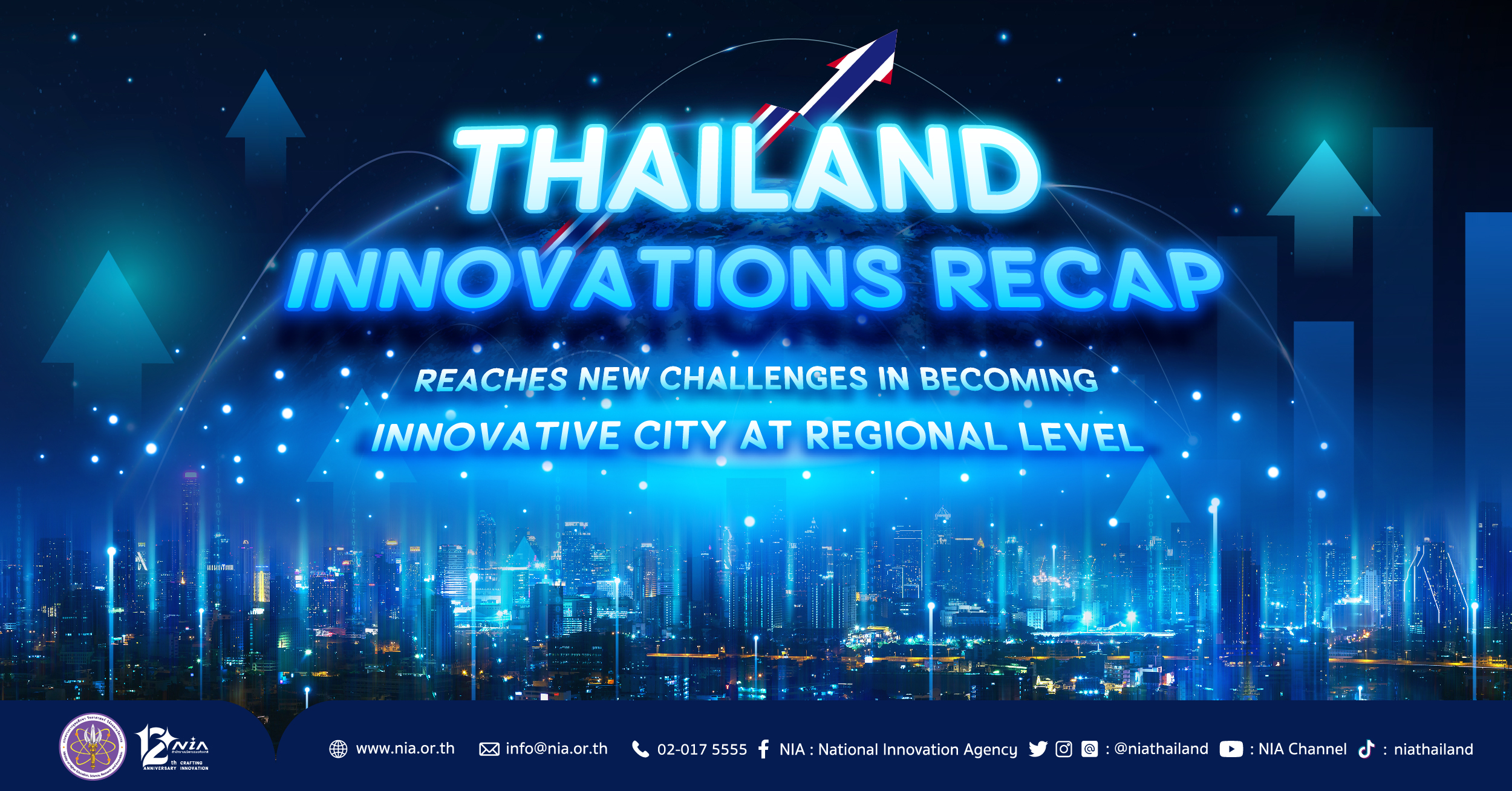- เกี่ยวกับเรา

เกี่ยวกับเรา
สำนักงานนวัตกรรมแห่งชาติ (องค์การมหาชน)
- บริการ

บริการ
การให้บริการของ NIA
- ข่าวสาร/บทความ

ข่าวสาร/บทความ
ความเคลื่อนไหวของ NIA
- ติดต่อเรา/แจ้งปัญหา

ติดต่อเรา/แจ้งปัญหา
ช่องทางในการติดต่อกับ NIA
Thailand Innovations Recap Reaches New Challenges in Becoming Innovative City at Regional Level
บทความ 1 มีนาคม 2565 7,427Thailand Innovations Recap Reaches New Challenges in Becoming Innovative City at Regional Level
NIA revealed Thailand Innovations recap in 2021, ready to shore up new challenges that may arise.
Dr Pun-Arj Chairatana, Executive Director of Thailand National Innovation Agency (Public Organization), or NIA revealed the success of promoting Thai innovation in 2021 with delight since the strong support has accelerated the overlook of growth in many dimensions, whether it be Deep Tech Innovation Business, increasing innovation opportunities at the regional and city levels, Thailand innovation ranking, reducing inequality, as well as a growing number of innovation businesses from the new generation. Together revealed the action plan in 2022 that continues to focus on innovation development amid the challenges of the world and continues to promote innovation to revitalize the economic and social sectors.
Dr Pun-Arj Chairatana, Executive Director of Thailand National Innovation Agency (Public Organization), revealed that in the past year, in the area of the growth of Thai innovation, the first noticeable growth is on Deep Tech, which has become a key element that enhanced competitiveness and changes in the current context. It is also the first year that NIA is the pioneer who has created a program to shore up Deep Tech Innovation in the six target industries including MedTech, FoodTech, AgTech, SpaceTech, Defense Tech, and ARI-Tech. The emphasis is on working with higher education institutions, research and technology institutes, and science parks across the country, to link in-depth research to develop into "Innovative Business" by the private sector. This includes supporting new Innovation-Based Enterprise (IBE) entrepreneurs to be able to develop innovative businesses with in-depth technology that can meet the changes of the future.
NIA aims to encourage Thai startups to turn themselves into Deep Tech through innovative business supporting programs that use Deep-Tech Regionalization, the distribution of innovation knowledge to different regions across the country. NIA has been working together with partners in the exclusive economic zone or EEC, such as PTT Public Company Limited (Thailand), Siam Kubota, Soonthorn Tanyasap Co., Ltd., etc., organizing an in-depth incubation activity for 10 ARI-Tech startups, which gave the opportunity for startups to work together in a co-creation manner at the NIA Deep Tech Incubation @EEC activity. During the five months, at least two startups were invested in, Alto Tech and MoveMax, which created a business value of more than 300 million bath. Additionally, two more startups are in the process of negotiating with further investors. Hence, NIA aims that by 2023, there will be around 100 companies capable of registering as Deep Tech companies, 60 companies currently have good potential. NIA also shoring up investment in FoodTech Startup through the SPACE – F project together with Thai Union Group Public Company Limited, Thai Beverage Public Company Limited, Betagro Company Limited, Deloitte Touche Tohmatsu Jaiyos Company Limited and the Faculty of Science Mahidol University.
The next point of interest is "Spatial Innovation Development", which currently has 12 cities or districts in operation, including 11 provinces in the Upper North and 12 provinces in the Upper Northeast. There are a total of 120 associates from state division, civil society, educational institutions, and research institutes, with approximately 12,000 innovators in the network. The newest neighborhood being “Aree Innovation District” which is characterized by ARI-Tech (AI, Robotics, and Immersive Technology), which is a collaboration with telecommunication companies, Government digital agencies and other private sectors.
In the past year, NIA has consistently focused on spreading access to innovation opportunities at the regional level. The emphasis is placed on working with local networks to capture the potential of each district, for example by allowing municipalities and citizens to participate in planning Maejo Agricultural and Food Innovation District and Suan Dok Medical Innovation District in Chiang-Mai, collaborating with municipalities to create a public space in the form of an innovation district that must have an Innovation Lab managing by local authorities, and working with universities and private sectors. This also includes setting up a Startup Global Hub providing business information, organizing networking activities, and giving Smart Visas to Foreigners working in innovation in the country, in order to drive innovation at the city and provincial level. Additionally, it is also important to stimulate the community economy by promoting and supporting SMEs and startups in the area through the "Nilmunggorn" campaign to link entrepreneurs in SMEs, start-ups, and social enterprises space with accessibility to basic regional innovation infrastructure. NIA hopes that the 20 qualified teams will be able to increase sales by at least 3 times or a total sales value of not less than 630 million baht, as well as accelerate brand awareness about 30%.
Dr Pun-Arj added that it is gratifying that for the result of the Global Startup Ecosystem Index, Thailand ranked 50, and four cities are ranked in the Top 1,000 City on the World’s Best Startup Ecosystem. Bangkok jumped 19 places from 90 to 71 in terms of e-commerce and retail technology, while Chiang-Mai ranked 397, Phuket ranked 442 (shot up 428 places from 870), and finally, a new city that has just entered the list for the first, Pattaya, which ranked 833.
In addition to driving the economy, NIA also places importance on working with four main stakeholder groups: the private sector, the local government division, education institutes - research institutes, and civil society in developing “Social Innovations” to improve the quality of life of people, especially in poor provinces. NIA focuses on poverty alleviation and inequality through the Social Innovation Village Project that relies on a mechanism to expand innovation for the community. Theseare the solutions to problems using various forms of innovation with a prototype or a completed model developed with a large network organization or international agencies to be able to distribute to communities or local administrative organizations. In the past year, 89 ready-to-use innovations were invented in 11 provinces, with 44,568 beneficiaries, creating a total social outcome value of 196.56 million baht. In addition, there was also a Social Innovation Project by Industries and a Social Innovation Project for Cities with challenges to create innovation for use in cities and create a model for solving problems arising from the expansion of urban society.
However, youth is a new target group that NIA places great emphasis on in laying the foundation of the education system to create a new society with innovative and creative ideas from a young age. Therefore, NIA has initiated the development of a modern learning management approach called STEAM4INNNOVATOR as the main process used to develop innovative entrepreneurs for youth. The focus is on integrating business potential development and entrepreneurship with knowledge and understanding of STEAM, such as Science, Technology, Engineering, Arts, and Mathematics for youth to be able to apply and create works based on various sciences and has a business innovation dimension that can be fully integrated. This is to create an innovative society and culture of creativity in Thailand, which is now widely accepted and expanded in more than 50 secondary schools. With more than 10,000 students through classroom teaching. The approach also includes the development of the Trainer's Lab project so that it can be used to develop youth further. As a result, youths who have undergone this process can successfully develop innovative businesses, such as meat imitation products from plant protein “Paepo Meat” from Narathiwat provincial community enterprises, mobile mushroom nursery from “FutureFarm Agriculture Innovation”, intelligent surveillance vehicle for shrimp catching “Volta”, and “TAOYAA”. TAOYAA is an application as an intermediary between people selling garbage and a shop that buys garbage partnered with rider service invented by high school students from Kajonkiet Suksa School which has piloted in Koh Kaew, Phuket, and has plans to expand to use in other provinces.
Moreover, there are activities to promote and develop the potential of the new generation through the Startup Thailand League project, which this year has a total of 40 universities participating in the activities across the country from both public and private. Over 48,000 students took part in the event, 400 teams participated in the Startup Business Idea Competition and approved students who received funding for the production of prototype works of 200 teams, total prize money of more than 5 million baht. The outstanding project this year is the Erythro-Sed Team from Chiang Mai University, a quality control device of the erythrocyte sedimentation rate (ESR) monitor and assessment of the expertise of the operators in ESR testing, which won the first place. Another team is the Theeotech Team from King Mongkut's University of Technology Thonburi, a web application that will help media producers such as Youtubers or TV stations, to create personalized sign language subtitles to help the hearing impaired be able to understand media through 3D sign language animations. The next one is the Perm Team from Chulalongkorn University, an information exchange platform between those who want the information to train machine learning and those who have information in hand, without intermediaries. In the past, there have been 4 teams of students participating in the company registration activity (registration value 4 million baht) and teams of students that further expanded into other activities, such as the Technology and Innovation Entrepreneur Development Fund (TED Fund), SIBB, Research to Market (R2M), and the Government Savings Bank, of more than 48 teams and received a total grant of approximately 4.8 million baht.
Dr Pun-arj concluded that, after all, NIA also has a goal to support innovations that can catch up with the challenges of the world, consisting of the Covid-19 epidemic that seems to prolong from the mutation of the virus, which the challenge lies in developing vaccines to keep up with the changes and promoting innovations that contribute to a new way of living. The economic slowdown caused by measures to prevent the spread of the Covid-19 virus focusing on supporting innovations that are in line with the country's workforce structure, the development of highly skilled workers based on Deep Technology, as well as to increase the distribution of innovative businesses in regional level to support relocation. The challenges on climate change focusing on reinforcing technology and innovation in production processes that do not pollute the environment including innovations in energy and environmentally friendly materials. Promote investment in Sustainable business operations (Environmental, Social, and Governance; ESG) by building a strong ecosystem, developing various social and environmental innovations as investment options, as well as setting guidelines and standards for assessing concrete impacts, and emerging technologies such as ARI, Metaverse and Biomed. The COVID-19 pandemic is considered a catalyst for changes and the adoption of technologies such as a cashless society, online meetings, Work From Home, telemedicine, and vaccine development. Although sometimes these technologies are emerging technologies that need further development, it is expected to create socio-economic changes such as the Creative Universe or the Metaverse that are in the spotlight today.
บทความที่เกี่ยวข้อง
- บริการ











